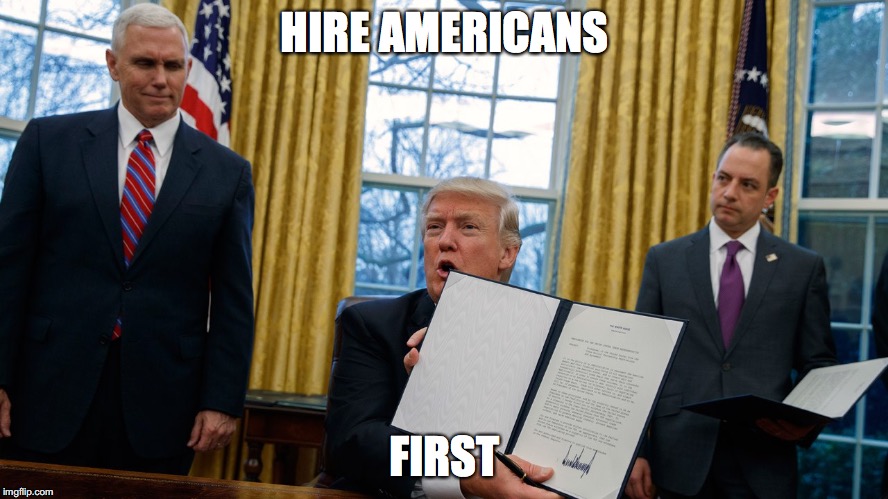As it happened, the world of IT was taking off and American companies all had increasing need for workers that could do programming to build "technological infrastructure" and compete in the rapidly changing markets. At that time, the labor market wasn't flooded with IT-savvy workers. So they determined to hire people like my dad who had demonstrated high aptitude in college without specifically learning the art of programming, and then they taught them how to program.
My dad is still at that game, the skills he learned became the foundation of his entire career.
Under the current climate, I wonder if he would have ever received that opportunity, because nowadays we see extensive usage of the H-1B visa. This component of the 1965 Immigration and Nationality Act has allowed American tech companies to expand their pool of possible workers to other tech-savvy nations such as India and China. There's a cap of 65k per year (although Hillary in her campaign proposed raising that cap to 195k per year). You get six years to work in the US as well as a path to permanent residency through this program.
As a part of his nationalist/protectionist economic platform, Donald Trump in his campaign proposed putting limits on the usage of H-1B visas, with stories such as Disney forcing American employees to train their foreign replacements garnering some headlines.
Today in the House of Representatives, a bill was introduced to raise the minimum salary for H-1B visas (which were intended to help staff American companies with skilled labor from abroad) from 60k per year to 130k per year.
The obvious intention of the bill is to reduce the tremendous cost benefit that companies get from hiring skill foreigners over Americans. For $70k per year maybe you'd be better off hiring less qualified or previously more expensive American workers and either dealing with it or training them. The (probably) intended consequence of this action is to force American companies that want to do business in the world's largest economy to take ownership over the development and well being of the locals.

This bill is inevitably going to engender immediate outcry and panic that will produce the following liens of rhetoric:
This is a racist policy that's bad for Indians!
This will devastate the US economy and force IT companies to go abroad!
Keep in mind that many of the people who will be pushing these two lines of attack in the media have a significant, bottom-line interest in this policy not being pushed through.
The morality of nationalist policy
Besides the economics issues at play, I believe there are two key moral reasons for why nationalist policies such as this one are actually wise for the government to pursue.
The first reason relates to the role of the state. While the expansion of American empire and influence abroad has often muddled the lines of responsibility, the US government's first priority is to its own citizens that choose their leaders, pay their taxes, and work to maintain the nation. Just as a father's first responsibility is to his own immediate family, a state's first responsibility is to the people that are directly under its care.
To pursue actions that work directly against their interests, such as allowing corporations to constantly decrease the price of labor through immigration while simultaneously helping universities to increase the price of education through immigration as well as wide scale loan programs, is frankly immoral.
The two main beneficiaries of that system are American elites, who don't need much help these days, and foreign workers. Neither of those two groups are evil or bad, they're using the current system to their advantage as anyone else would do, but the state should be looking to create a system that works to the advantage of its own people. That's what they were elected and empowered to do.
The other moral reason relates to avoiding the likely consequences. Raising the price of education in a world where the job market puts an increasing value on education while simultaneously artificially increasing the labor pool to shrink the number of available jobs and the price of labor is frankly a societally risky, get-rich quick scheme.
The risk is that you create a generation of intelligent, hard-working young men (and women) who don't leave school to find themselves valued, don't find opportunities in the workforce, and don't find empowerment to start and raise families. Creating a supply of young men who are uninitiated, bitter, and highly intelligent is a preposterously foolish thing for a state to do. What do you suppose they might start to turn their energies towards?
Some of them will create new entrepreneurial ventures that fill this gap and enable their brethren. Others are going to become angry and potentially turn their energies and giftings towards ventures that are unhealthy for themselves, or society, or the state itself.
Every time you hear someone ask what will happen to India's skilled workers consider the flip side of that consideration, what is going to happen to American workers?
The U.S. needs to continue to embrace more nationalism in order to guarantee that Americans and American power are a positive force in the world rather than a bitter and frustrated one.
No comments:
Post a Comment